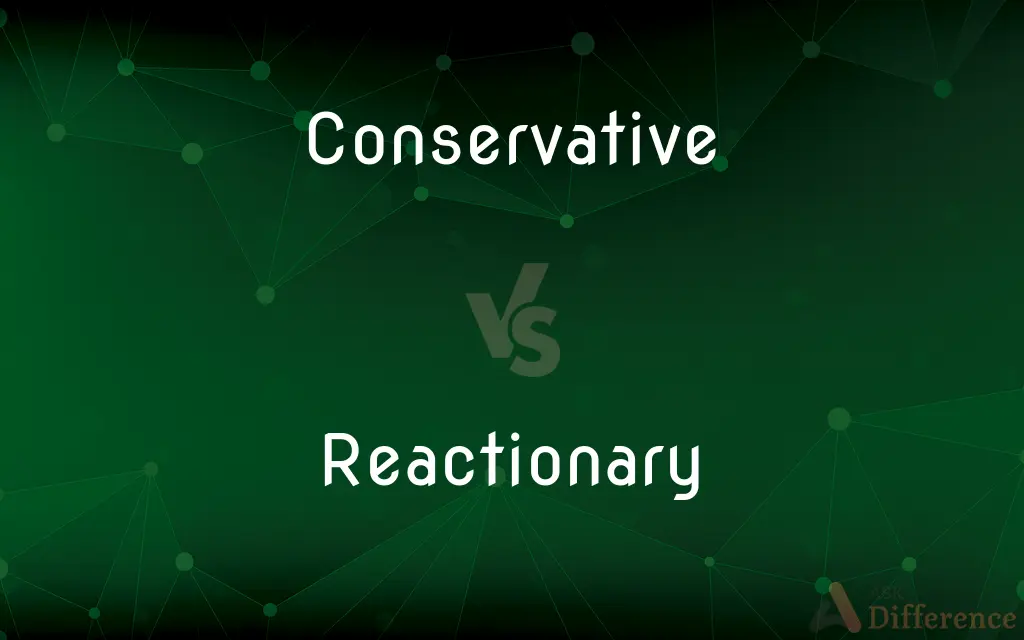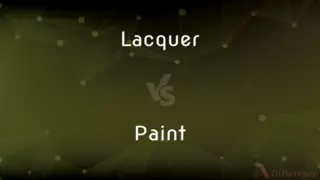Conservative vs. Reactionary — What's the Difference?
By Maham Liaqat & Urooj Arif — Updated on April 4, 2024
Conservatism emphasizes maintaining existing social orders and institutions, while reactionaries seek to return society to a previous state, often idealizing the past.

Difference Between Conservative and Reactionary
Table of Contents
ADVERTISEMENT
Key Differences
Conservatives generally advocate for preserving traditional values and institutions, viewing gradual change as the best approach to societal evolution. They often emphasize stability, law and order, and the importance of family and community structures. On the other hand, reactionaries are characterized by their desire to reverse modern developments and return society to a perceived better, more orderly past. While conservatives might resist radical changes, reactionaries actively work to undo them, often idealizing historical periods they view as superior.
While conservatism is a broad political philosophy that can adapt to changes in the societal consensus, holding that any change should be incremental and rooted in the existing traditions, reactionaries often see the current state of society as a deviation from an ideal. They aim not just to halt progress but to revert it, based on a belief that certain historical norms and values were fundamentally correct.
Conservatives often work within the existing political framework, leveraging it to slow down or moderate changes they see as harmful to societal stability. They are more likely to support reforms that strengthen traditional structures or gradually improve systems without radical overhaul. Reactionaries, whereas, may reject the current political framework entirely if they believe it supports a decline from the idealized past, advocating for more drastic measures to restore what they see as the natural order.
In terms of social policies, conservatives typically support measures that they believe will uphold family values and societal cohesion, such as policies that encourage traditional marriage and community welfare programs that do not undermine personal responsibility. Reactionaries, on the other hand, might oppose modern social policies altogether, arguing that they erode the traditional social fabric and hierarchies that they wish to restore.
Conservatives might support free-market principles but also endorse the role of government in regulating certain aspects of the economy to maintain order, protect national interests, and ensure moral standards. Reactionaries might either advocate for a return to a more hierarchical and less free-market-oriented economy they believe existed in the past or, conversely, argue for a radical dismantling of current economic structures they view as corrupt or degenerative.
ADVERTISEMENT
Comparison Chart
Political Beliefs
Prefers gradual change within the system.
Seeks to reverse change, returning to a previous system.
View on Society
Values traditional institutions and practices.
Idealizes and aims to restore a past societal order.
Approach to Change
Advocates for slow, incremental reforms.
Supports drastic measures to revert to an idealized past.
Economic Policy
May support free markets with some government regulation.
Preferences can vary but often involve radical restructuring.
Social Policy
Supports policies upholding traditional values and structures.
Opposes modern social policies, seeing them as degenerative.
Compare with Definitions
Conservative
A political ideology focused on preserving existing social orders and institutions.
Conservatives often oppose radical changes to marriage laws, arguing for the preservation of traditional values.
Reactionary
Aims to revert society to a past state believed to be superior.
Reactionaries might campaign for the reinstatement of monarchy in countries that are now republics.
Conservative
Prioritizes security and public safety, supporting strong law enforcement measures.
Conservatives often advocate for policies that enhance police powers to ensure community safety.
Reactionary
Seeks to maintain cultural purity and resist global influences.
Reactionaries often resist the spread of global pop culture, promoting local traditions instead.
Conservative
Advocates for gradual reforms rather than abrupt societal shifts.
Conservatives support slowly implementing policies to assess their impact on society's fabric.
Reactionary
Critiques and rejects modern societal developments.
Reactionaries often dismiss contemporary art and culture as decadent or morally corrupt.
Conservative
Favors a market economy with some level of government oversight.
Conservatives might back tax incentives for businesses while endorsing regulations that protect public morality.
Reactionary
Supports dramatic actions to reinstate traditional values and structures.
Reactionaries could advocate for overhauling the current educational system to reflect traditional curricula.
Conservative
Emphasizes the importance of familial and communal bonds as societal cornerstones.
Conservatives campaign for family-friendly policies, such as tax breaks for married couples.
Reactionary
May desire a return to pre-globalization economic models.
Reactionaries might oppose free trade agreements, favoring protectionist policies to safeguard national industries.
Conservative
Favoring traditional views and values; tending to oppose change.
Reactionary
In political science, a reactionary or reactionist is a person or entity holding political views that favor a return to a previous political state of society that they believe possessed positive characteristics that are absent in contemporary society. As an adjective, the word reactionary describes points of view and policies meant to restore a past status quo.
Conservative
Traditional or restrained in style
A conservative dark suit.
Reactionary
Characterized by reaction, especially opposition to progress or liberalism; extremely conservative
The principal is very reactionary.
She wants the school to stay the way it has been for the last 50 years.
Conservative
Moderate; cautious
A conservative estimate.
Reactionary
An opponent of progress or liberalism; an extreme conservative.
Conservative
Of or relating to the political philosophy of conservatism.
Reactionary
(politics) Favoring a return to an alleged golden age of the past; anti-progressive.
Conservative
Belonging to a conservative party, group, or movement.
Reactionary
(chemistry) Of, pertaining to, participating in, or inducing a chemical reaction.
Conservative
Conservative Of, designating, or characteristic of a political party founded on or associated with principles of social and political conservatism, especially in the United Kingdom or Canada.
Reactionary
In reaction to; as a result of.
Conservative
Conservative Of or adhering to Conservative Judaism.
Reactionary
(politics) One who is opposed to progress and change and wants to reverse it, wishing for a return to an alleged, mythical golden age of the past.
Conservative
Tending to conserve; preservative
The conservative use of natural resources.
Reactionary
Being, causing, or favoring reaction; as, reactionary movements.
Conservative
One favoring traditional views and values.
Reactionary
One who favors reaction, or seeks to undo political progress or revolution.
Conservative
A supporter of political conservatism.
Reactionary
An extreme conservative; an opponent of progress or liberalism
Conservative
Conservative A member or supporter of a Conservative political party.
Reactionary
Extremely conservative
Conservative
A person who favors maintenance of the status quo.
Conservative
(politics) One who opposes changes to the traditional institutions of their country.
Conservative
A person who favors decentralization of political power and disfavors interventionist foreign policy.
Conservative
A fiscal conservative.
Conservative
A social conservative.
Conservative
Cautious, moderate.
The chef added a conservative amount of salt to the dish.
Conservative
Tending to resist change or innovation.
The curriculum committee at this university is extremely conservative.
Conservative
Based on pessimistic assumptions.
At a conservative estimate, growth may even be negative next year.
Conservative
Supporting some combination of fiscal, political or social conservatism.
Conservative
Relating to the Conservative Party.
Conservative
Neither creating nor destroying a given quantity.
Conservative
Having power to preserve in a safe or entire state, or from loss, waste, or injury; preservative.
Conservative
(Judaism) Relating to Conservative Judaism.
Conservative
(clothing) Conventional, traditional, and moderate in style and appearance; not extreme, excessive, faddish, or intense.
Conservative
(medicine) Not including any operation or intervention (said of a treatment, see conservative treatment)
Conservative
Having power to preserve in a safe of entire state, or from loss, waste, or injury; preservative.
Conservative
Tending or disposed to maintain existing institutions; opposed to change or innovation.
Conservative
Of or pertaining to a political party which favors the conservation of existing institutions and forms of government, as the Conservative party in England; - contradistinguished from Liberal and Radical.
We have always been conscientiously attached to what is called the Tory, and which might with more propriety be called the Conservative, party.
Conservative
One who, or that which, preserves from ruin, injury, innovation, or radical change; a preserver; a conserver.
The Holy Spirit is the great conservative of the new life.
Conservative
One who desires to maintain existing institutions and customs; also, one who holds moderate opinions in politics; - opposed to revolutionary or radical.
Conservative
A member of the Conservative party.
Conservative
A person who has conservative ideas or opinions
Conservative
Resistant to change
Conservative
Opposed to liberal reforms
Conservative
Avoiding excess;
A conservative estimate
Conservative
Unimaginatively conventional;
A colorful character in the buttoned-down, dull-gray world of business
Conservative
Conforming to the standards and conventions of the middle class;
A bourgeois mentality
Common Curiosities
Can conservatives support economic regulations?
Yes, conservatives may endorse limited government intervention to preserve social order and moral standards.
Why do reactionaries oppose modern social policies?
They believe these policies erode traditional values and hierarchies they wish to restore.
Do conservatives reject all forms of progress?
No, conservatives accept progress that aligns with traditional values and is implemented gradually.
Can a person be both conservative and reactionary?
Individuals might hold a mix of views, but pure reactionaries specifically aim to reverse modernity.
Is conservatism the same worldwide?
While the core principles of conservatism are similar, specific beliefs and policies can vary by country.
Do reactionaries have a place in modern politics?
Reactionary movements are present in many countries, often as part of broader conservative or populist movements.
How do reactionaries propose to change society?
Through drastic measures intended to reinstate a past societal order they view as superior.
Are conservative and reactionary views always opposed to each other?
While they share some similarities, their methods and goals regarding change significantly differ.
How do conservatives view law and order?
As a cornerstone of societal stability, endorsing strong law enforcement and judicial systems.
What economic model do reactionaries favor?
Their preferences can vary widely, from pre-industrial structures to free-market economies, depending on the past they idealize.
What defines a conservative approach?
Conservatives prefer preserving existing societal structures and values, advocating for gradual changes.
How do reactionaries view change?
Reactionaries seek to undo modern changes, returning society to an idealized past.
How do conservatives approach social policies?
They support policies that they believe will reinforce traditional family structures and societal cohesion.
What drives reactionary opposition to modernity?
A belief that modern developments undermine societal stability and moral values.
Can conservatism adapt to societal changes?
Yes, conservatism can incorporate changes that are seen as consistent with its underlying values, but it prefers those changes to be incremental.
Share Your Discovery

Previous Comparison
Lacquer vs. Paint
Next Comparison
Eyeliner vs. MascaraAuthor Spotlight
Written by
Maham LiaqatCo-written by
Urooj ArifUrooj is a skilled content writer at Ask Difference, known for her exceptional ability to simplify complex topics into engaging and informative content. With a passion for research and a flair for clear, concise writing, she consistently delivers articles that resonate with our diverse audience.
















































